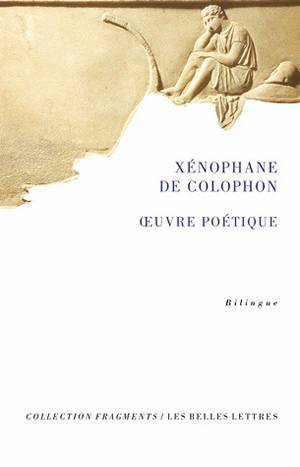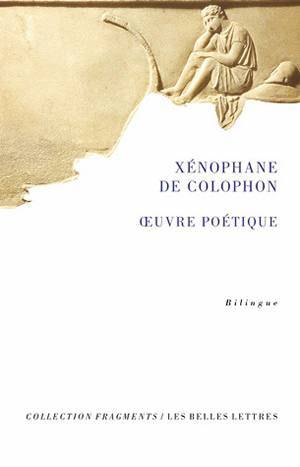
- Afhalen na 1 uur in een winkel met voorraad
- Gratis thuislevering in België vanaf € 30
- Ruim aanbod met 7 miljoen producten
- Afhalen na 1 uur in een winkel met voorraad
- Gratis thuislevering in België vanaf € 30
- Ruim aanbod met 7 miljoen producten
Zoeken
Omschrijving
English summary: Xenophanes of Colophon, poet and thinker of the end of the 6th and the beginning of the 7th century, is an enigmatic character. Regarding his life, only a few witness accounts remain. He criticized Homer and Hesiod for the "lies" they told regarding the subject of the gods and contended the popular beliefs, the superstitions, the received ideas and the behaviors of his contemporaries, which left for his successors a memory of a bitter satirist and an austere moralizer. However, Xenophanes is also linked to the history of philosophy: disciple of philosophers of Milet (Anaximander or Archelaus), he took a stance against the theories of Thales and Pythagoras, became the author of a didactic poem (On Nature), and was the first to affirm the unity of divinity and being. Unfortunately, his works are not well preserved. The remaining fragments are written in verse, in a language that attempts to bring together poetic archaisms, philosophical precision, rigor of reasoning, and modern vocabulary. Provided here are the original Greek text and its translation, supplemented by notes that provide an overview of the different poetic and philosophical interpretations of ancient and modern commentators. French text. French description: Xenophane de Colophon, poete et penseur de la fin du VIe siecle et du debut du siecle suivant, est un personnage enigmatique, au coeur de nombreuses interrogations. Sur sa vie, il ne nous reste que tres peu de temoignages, tres peu de certitudes et quelques legendes qui ont suffi a lui forger une reputation. Critiquant severement Homere et Hesiode pour les mensonges qu'ils ont contes au sujet des dieux, attaquant les croyances populaires, les superstitions, les idees recues et les comportements de ses contemporains, il a laisse a ses successeurs, pour des siecles, le souvenir d'un satiriste acerbe et d'un austere moralisateur. Mais Xenophane est aussi lie a l'histoire de la philosophiea: disciple des philosophes de Milet - d'Archelaos ou d'Anaximandre selon les sources -, il aurait pris position contre certaines theories de Thales et de Pythagore, serait l'auteur d'un grand poeme didactique intitule Sur la nature et aurait le premier affirme l'unite de la divinite et celle de l'etre. En tant que tel, il aurait ete le maitre de Parmenide et le fondateur de l'ecole d'Elee. Il est probable que la legende exagere l'importance qu'a pu avoir Xenophane dans l'histoire de la philosophie. On retrouve cependant des echos de sa pensee chez les plus grands philosophes des siecles posterieurs, et notamment chez Platon, chez Aristote, ses eleves et ses commentateurs, chez Ciceron, ou encore, bien plus tard, dans les ecrits des auteurs chretiens qui ont vu en Xenophane le premier theologien monotheiste. L'oeuvre de Xenophane a malheureusement souffert d'une tres mauvaise transmission. Les fragments qui nous en restent sont ecrits en vers, dans une langue qui tente de concilier archaismes poetiques d'une part, precision philosophique, rigueur de raisonnement, vocabulaire moderne d'autre part. Ces vers sont manifestement l'oeuvre d'un esprit critique des plus vifs, exigeant et rigoureux, et laissent entrevoir une personnalite profondement originale, avide de connaissance et de verite. Le lecteur dispose du texte grec et de sa traduction, accompagnee de notes qui donnent un apercu des differentes interpretations poetiques et philosophiques proposees pour ces fragments par les commentateurs antiques et modernes.
Specificaties
Betrokkenen
- Auteur(s):
- Vertaler(s):
- Uitgeverij:
Inhoud
- Aantal bladzijden:
- 190
- Taal:
- Oudgrieks, Frans
Eigenschappen
- Productcode (EAN):
- 9782251742144
- Verschijningsdatum:
- 5/12/2012
- Uitvoering:
- Paperback
- Formaat:
- Trade paperback (VS)
- Afmetingen:
- 140 mm x 210 mm
- Gewicht:
- 230 g

Alleen bij Standaard Boekhandel
+ 80 punten op je klantenkaart van Standaard Boekhandel
Beoordelingen
We publiceren alleen reviews die voldoen aan de voorwaarden voor reviews. Bekijk onze voorwaarden voor reviews.











